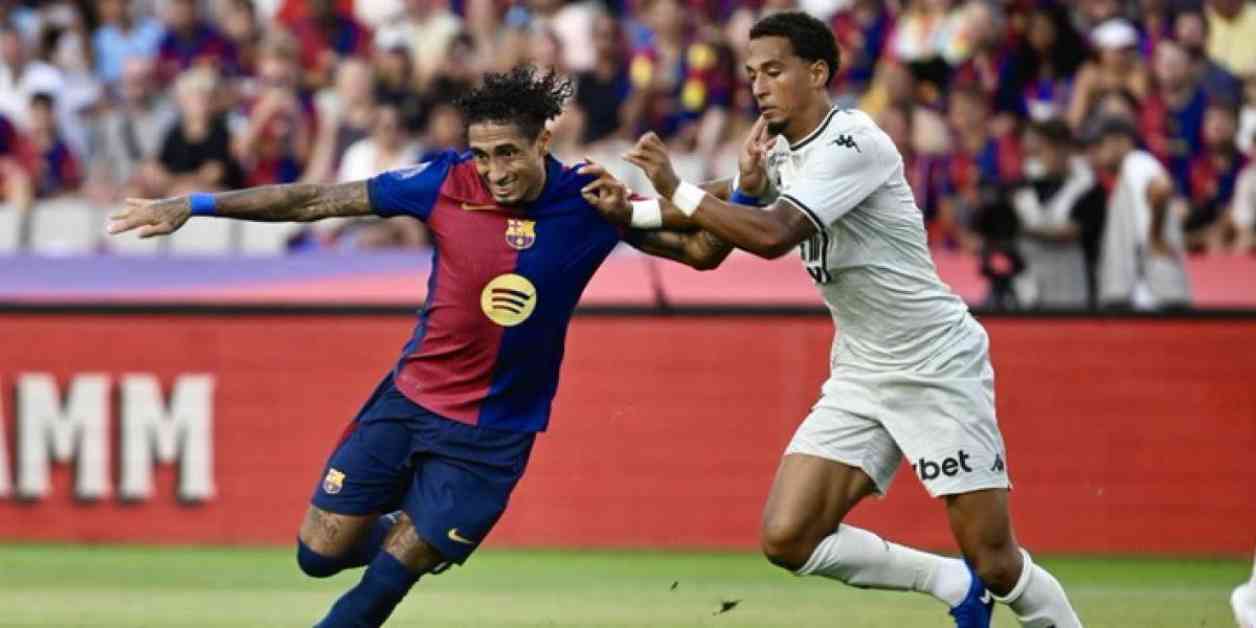Montjuic Grass: Environmental Concerns and Solutions for FC Barcelona
FC Barcelona faced a tough pre-season match against Monaco at the Joan Gamper stadium, resulting in a heavy loss for Flick’s team. The match served as a warning sign ahead of the upcoming league start against Valencia. However, apart from the disappointing performance on the field, another issue raised concerns – the state of the pitch at Montjuic.
During the match, it was evident that the grass on the pitch was not at the usual level of perfection that Barça is accustomed to. The green surface showed signs of unevenness and deterioration, impacting the flow of the game. The ball did not roll smoothly, hindering the team’s ability to execute their game plan effectively.
The turf troubles at Montjuic can be attributed to the recent replanting of grass for the start of the 2024-25 season. The stadium hosted four concerts over the summer, leading to the need for new grass to be laid down. However, the rushed nature of the process may have contributed to the subpar quality of the playing surface.
Environmental concerns have also been raised regarding the maintenance of the grass at Montjuic. With the increasing focus on sustainability and eco-friendly practices in sports, it is essential for FC Barcelona to address these issues and implement solutions to ensure a healthy playing environment for the team.
Subheadings:
Environmental Impact of Turf Maintenance at Montjuic
Challenges Faced in Turf Management
Sustainable Solutions for Maintaining the Grass at Montjuic
Environmental Impact of Turf Maintenance at Montjuic
The maintenance of grass at stadiums like Montjuic can have significant environmental implications. Traditional turf management practices often involve the use of chemical fertilizers, pesticides, and herbicides to maintain the quality of the grass. However, these chemicals can leach into the soil and water, causing harm to the surrounding ecosystem.
In addition, the constant mowing and watering of the grass require a significant amount of water and energy, contributing to carbon emissions and water wastage. As a prominent football club, FC Barcelona has a responsibility to minimize its environmental footprint and adopt sustainable practices in turf management.
Challenges Faced in Turf Management
Maintaining a high-quality playing surface at Montjuic presents various challenges for FC Barcelona. The stadium hosts not only football matches but also concerts and other events, putting additional strain on the grass. The frequent use of the stadium can lead to compaction of the soil, poor drainage, and uneven growth of the grass.
Furthermore, the climate in Barcelona, with its hot summers and mild winters, poses challenges for turf management. The grass requires adequate sunlight, water, and nutrients to thrive, but extreme weather conditions can impact its health and quality. Finding a balance between meeting the needs of the grass and ensuring its durability for sports events is essential for the club.
Sustainable Solutions for Maintaining the Grass at Montjuic
To address the environmental concerns and challenges faced in turf management at Montjuic, FC Barcelona can implement sustainable solutions to promote healthier grass growth and reduce the stadium’s ecological impact. One approach is to transition to organic turf management practices that prioritize soil health, natural fertilizers, and pest control methods.
Introducing native grass species that are well-adapted to the local climate can also improve the resilience of the turf and reduce the need for excessive maintenance. Additionally, incorporating smart irrigation systems and rainwater harvesting techniques can help conserve water and minimize waste in turf management.
Furthermore, engaging in community outreach programs and educational initiatives can raise awareness about the importance of sustainable turf management practices and inspire fans and stakeholders to support environmentally friendly initiatives at Montjuic. By demonstrating leadership in environmental stewardship, FC Barcelona can set a positive example for other sports organizations and contribute to the preservation of natural resources for future generations.
In conclusion, the environmental concerns and turf troubles at Montjuic highlight the importance of prioritizing sustainability in sports facility management. By implementing sustainable solutions and adopting eco-friendly practices, FC Barcelona can ensure a healthy and resilient playing surface at Montjuic while minimizing its impact on the environment. As a leading football club, Barça has the opportunity to lead by example and inspire positive change in the sports industry towards a greener and more sustainable future.

